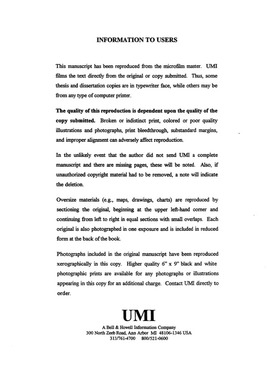| dc.contributor.advisor | Morgan, Carolyn S., | en_US |
| dc.contributor.author | Matthews, Rhonda Arnell. | en_US |
| dc.date.accessioned | 2013-08-16T12:30:19Z | |
| dc.date.available | 2013-08-16T12:30:19Z | |
| dc.date.issued | 1998 | en_US |
| dc.identifier.uri | https://hdl.handle.net/11244/5719 | |
| dc.description.abstract | Further work and research is recommended to better quantify cultural factors of academic success. Additionally, systemic changes at the university level such as the development of formal, structured mentoring relationships between faculty and students, opportunities for facilitated dialogue, mandatory diversity training for all students, increased support and evaluation of campus services to ethnic minority students and a moratorium on first year "rushing" and "pledging" for all Greek letter organizations, are recommended as positive actions that the university institute. This reorganization is expected to precipitate changes in the university environment which will make it a more positive foundation for student learning, thereby making it a "university family." | en_US |
| dc.description.abstract | The qualitative portion of the study reveals two categories of responses to two open ended questions--positive and negative. In each of the two categories, responses yielded two or three themes per sub-sample. Positive responses for all sub-samples included the themes "relationships with others", "support of the respective campus ethnic communities" and "opportunities for growth." Negative responses for the African-American sample include the themes "general campus atmosphere", "relationships with other African-Americans" and "campus racism." Negative responses for the Native American sample include the themes "campus atmosphere" and "campus racism." Lastly the themes for the Hispanic sub-sample include "institutional racism", "separation and isolation, " and "cultural identity." Negative comments presented by sample members outnumbered positive responses. | en_US |
| dc.description.abstract | The sample consists of 68 African-American, 19 Native American and 15 Hispanic students; who were first time entering, first year students in 1990 at the University of Oklahoma. Quantitatively, their academic success is measured by number of hours completed, university grade point average and graduation in four year. The findings are consistent with previously conducted research on the "traditional" predictors of success. High school grade point average is the most accurate predictor. Cultural factors are more difficult to quantify, but there are some variables that have positive correlation with academic success and some that indicate a negative correlation. Those variables with positive relationships to the variable number of hours completed are OU's efforts to assist ethnic students; attitude regarding university activities and high school grade point average. The variable with a positive relationship to the variable university grade point average is high school grade point average. Negative correlations to number of hours completed include the variables attitudes regarding OU's efforts to assist and integration into the university community. The variable with a negative correlation to the graduation in four years is integration into the university community via campus living. | en_US |
| dc.description.abstract | Previous research has indicated that factors such as high school grade point average and standardized test scores can accurately and consistently predict the success of college students, regardless of ethnicity. There are also other non-cognitive factors that influence academic success in college, regardless of the ethnicity of the student. However, this research aims to investigate some cultural correlates of the academic success of ethnic minority students at a predominantly Anglo university. | en_US |
| dc.format.extent | x, 156 leaves ; | en_US |
| dc.subject | Sociology, Ethnic and Racial Studies. | en_US |
| dc.subject | Minority college students. | en_US |
| dc.subject | Minority college students Oklahoma. | en_US |
| dc.subject | Academic achievement. | en_US |
| dc.subject | Education, Higher. | en_US |
| dc.title | Correlates of academic success for ethnic minority students enrolled at a predominantly Anglo university. | en_US |
| dc.type | Thesis | en_US |
| dc.thesis.degree | Ph.D. | en_US |
| dc.thesis.degreeDiscipline | Department of Sociology | en_US |
| dc.note | Major Professor: Carolyn S. Morgan. | en_US |
| dc.note | Source: Dissertation Abstracts International, Volume: 59-09, Section: A, page: 3657. | en_US |
| ou.identifier | (UMI)AAI9905635 | en_US |
| ou.group | College of Arts and Sciences::Department of Sociology | |
